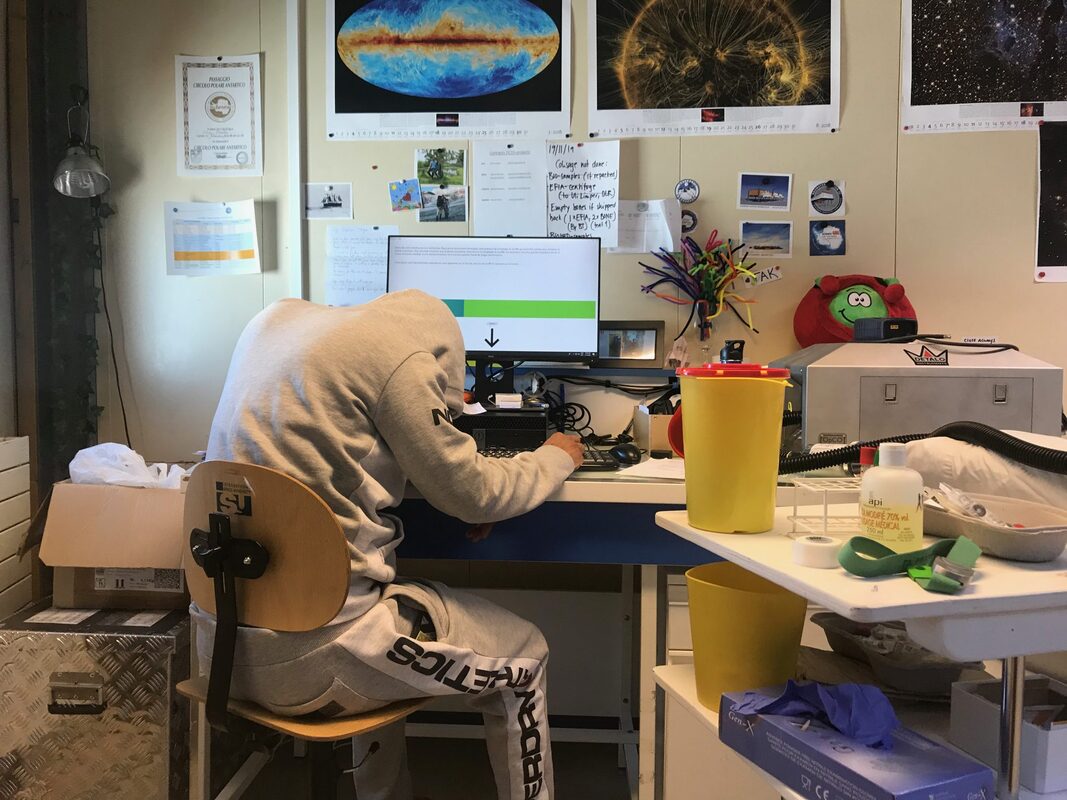|
We continue to follow along with the wonderful experience of ESA-sponsored Dr Stijn Thoolen during his year spent at the Concordia research station in Antarctica. Catch-up with his previous blogs at Part 1, Part 2, Part 3, Part 4, Part 5, Part 6, Part 7, Part 8 Dr Stijn ThoolenMedical Research Doctor, Concordia Research Station, Antarctica Fortunately it is not all body fluids (and solids) in the ESA lab. Other projects are more interested in the psychological adaptation to space-like environments. How do we deal mentally with the isolation far from home, the confinement, monotony, and life in a small international crew? The experiences and stressors that crews face during such missions require a certain degree of mental resilience, or may otherwise result in cognitive or behavioural problems and a loss of performance that can be dangerous to both the crew and the mission. To facilitate such psychological adaptation and resilience, the scientists behind MINDFULICE (‘role of mindfulness disposition in an isolated and confined environment’) for example are investigating the use of ‘mindfulness’ as a tool for deep space missions. ‘But isn’t that something for Buddhist monks?’, I hear you question… I actually like to think it is quite the opposite. And although maybe it isn’t an easy construct to grasp, we are all already mindful to a certain degree. Perhaps it is best to think of it as a mental process, of being aware in the present moment, welcoming what is new with an intention of kindness and compassion, and being open-minded enough to see new possibilities in any given situation rather than relying on what you have previously learned. Everyone does that to a certain degree, but everyone can also learn to do it more. Perhaps that is the biggest reason that the concept is gaining so much popularity so quickly. In our stressful and busy lives, mindfulness helps us to see solutions rather than problems, and research has already demonstrated many of its benefits, spanning from health and well-being to even business and artistic endeavours! A mindful attitude has shown to reduce stress while increasing resilience, task performance, enjoyment, psychological and even physical well-being, and in general a higher quality of life. That, I would say, is the promising power of the mind! So can mindfulness also help astronauts to cope with the harshness of a deep space mission? We like to think so, but to find out we must first understand how it relates to stress and psychological wellbeing in such conditions, and Concordia serves as the ideal testing ground. Of course that means more tests for us, so over the year we fill in questionnaires and perform attention tasks to determine how mind- and stressful we actually are. And how about you? Are you mindful enough to one day float to the stars? Note: this article was originally posted on the ESA blog website (LINK) and permission has been obtained to republish it here.
Comments are closed.
|
Welcometo the InnovaSpace Knowledge Station Categories
All
|
InnovaSpace Ltd - Registered in England & Wales - No. 11323249
UK Office: 88 Tideslea Path, London, SE280LZ
Privacy Policy I Terms & Conditions
© 2024 InnovaSpace, All Rights Reserved
UK Office: 88 Tideslea Path, London, SE280LZ
Privacy Policy I Terms & Conditions
© 2024 InnovaSpace, All Rights Reserved


 RSS Feed
RSS Feed